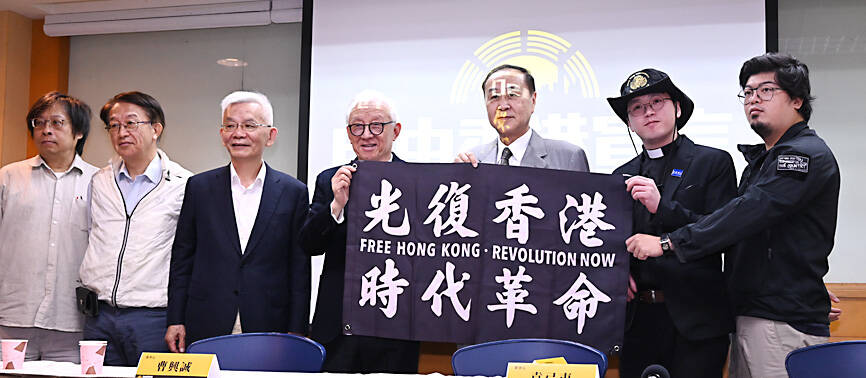The Overseas Hong Kong Council, planned and formed by Hong Kongers in Taiwan, is expected to begin voting for representatives in March, project organizers Elmer Yuen (袁弓夷) and Alan Keung (姜嘉偉) said yesterday.
The organizers told a news conference at National Taiwan University Alumni Hall that all Hong Kongers, both in Hong Kong and abroad, can vote electronically as long as they meet the voting criteria.
Yuen said the Chinese Communist Party (CCP) is ultimately to blame for oppressing freedom in Hong Kong and that the council — which would be empowered to enact legislation — is founded to restore freedom and sovereignty to the people of Hong Kong.

Photo: Liu Hsin-de, Taipei Times
If Hong Kong is to stand again, it must rely on itself, Yuen said.
Keung said that Hong Kongers could not win under the electoral rules imposed by the CCP, and the council offers a chance to remove Hong Kong from the Chinese framework, a move that is Hong Kongers’ only way out.
He said that continued interactions with the international community after their council’s founding would increase its chances of being recognized, thereby highlighting the illegality of the Hong Kong Legislative Council.
Yuen said it is understandable that there are security concerns regarding the council’s intent to uphold the general election system via electronic voting.
He added that the preparatory committee spent two years creating an information security system that would generate a specific password for an eligible individual, determined by scanning the chip in the person’s passport.
Ballot counters would not be able to tell who voted, he said, adding that the committee has done everything possible to assuage voters’ concerns regarding information security risks.
Yuen said he understood that, despite such measures, some might still abstain from voting out of fear of the CCP.
The sentencing of 45 democracy advocates in the territory by the Hong Kong High Court last month would inevitably affect people’s support for and the legitimacy of the Legislative Council, Yuen said, adding that he was familiar with the CCP’s tactics and would try his best to promote the council over the next three months.
Forty-seven people were charged with conspiracy to commit subversion after holding unofficial primaries in July 2020 in a bid to make a shortlist aimed at gaining a pro-democracy majority in the legislature.
Keung said that voting is the most basic and civilized option of government and is the seed of Hong Kongers’ revolution.
Who is ultimately elected does not matter; what matters is that the framework of one person, one vote is established, he said.
United Microelectronics Corp (聯電) founder Robert Tsao (曹興誠) yesterday stated his support for Yuen, Hong Kongers and any others who hope to give power to the public.
The new council would propose candidates starting next month, with debates held in February and voting to commence in March, the council said.

The CIA has a message for Chinese government officials worried about their place in Chinese President Xi Jinping’s (習近平) government: Come work with us. The agency released two Mandarin-language videos on social media on Thursday inviting disgruntled officials to contact the CIA. The recruitment videos posted on YouTube and X racked up more than 5 million views combined in their first day. The outreach comes as CIA Director John Ratcliffe has vowed to boost the agency’s use of intelligence from human sources and its focus on China, which has recently targeted US officials with its own espionage operations. The videos are “aimed at

STEADFAST FRIEND: The bills encourage increased Taiwan-US engagement and address China’s distortion of UN Resolution 2758 to isolate Taiwan internationally The Presidential Office yesterday thanked the US House of Representatives for unanimously passing two Taiwan-related bills highlighting its solid support for Taiwan’s democracy and global participation, and for deepening bilateral relations. One of the bills, the Taiwan Assurance Implementation Act, requires the US Department of State to periodically review its guidelines for engagement with Taiwan, and report to the US Congress on the guidelines and plans to lift self-imposed limitations on US-Taiwan engagement. The other bill is the Taiwan International Solidarity Act, which clarifies that UN Resolution 2758 does not address the issue of the representation of Taiwan or its people in

US Indo-Pacific Commander Admiral Samuel Paparo on Friday expressed concern over the rate at which China is diversifying its military exercises, the Financial Times (FT) reported on Saturday. “The rates of change on the depth and breadth of their exercises is the one non-linear effect that I’ve seen in the last year that wakes me up at night or keeps me up at night,” Paparo was quoted by FT as saying while attending the annual Sedona Forum at the McCain Institute in Arizona. Paparo also expressed concern over the speed with which China was expanding its military. While the US

SHIFT: Taiwan’s better-than-expected first-quarter GDP and signs of weakness in the US have driven global capital back to emerging markets, the central bank head said The central bank yesterday blamed market speculation for the steep rise in the local currency, and urged exporters and financial institutions to stay calm and stop panic sell-offs to avoid hurting their own profitability. The nation’s top monetary policymaker said that it would step in, if necessary, to maintain order and stability in the foreign exchange market. The remarks came as the NT dollar yesterday closed up NT$0.919 to NT$30.145 against the US dollar in Taipei trading, after rising as high as NT$29.59 in intraday trading. The local currency has surged 5.85 percent against the greenback over the past two sessions, central